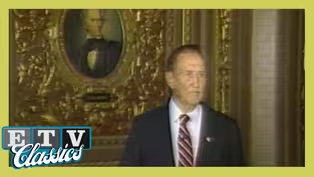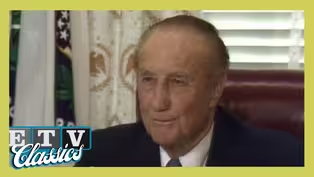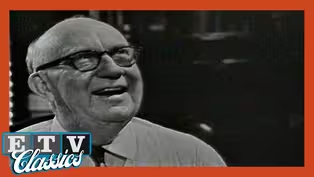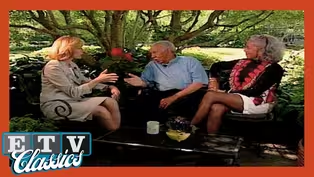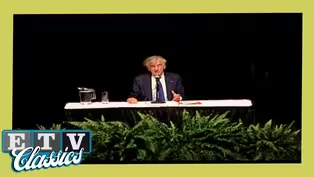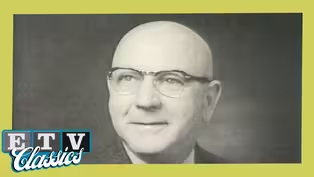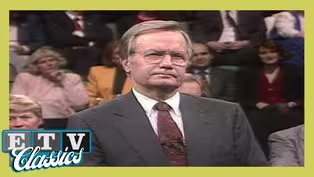ETV Classics
The Governors' Roundtable | Carolina Journal (1989)
Season 15 Episode 17 | 57m 54sVideo has Closed Captions
A round-table discussion with nine men who served as governor of the state of South Carolina.
In this gem from the ETV Tape Vault, Carolina Journal shares a historic gathering not seen before or since! On November 17, 1989, nine men who served as governor of the state of South Carolina met together at Cottingham Theatre on the campus of Columbia College in South Carolina for a two-hour roundtable discussion. Tom Fowler served as moderator for this gathering.
Problems playing video? | Closed Captioning Feedback
Problems playing video? | Closed Captioning Feedback
ETV Classics is a local public television program presented by SCETV
Support for this program is provided by The ETV Endowment of South Carolina.
ETV Classics
The Governors' Roundtable | Carolina Journal (1989)
Season 15 Episode 17 | 57m 54sVideo has Closed Captions
In this gem from the ETV Tape Vault, Carolina Journal shares a historic gathering not seen before or since! On November 17, 1989, nine men who served as governor of the state of South Carolina met together at Cottingham Theatre on the campus of Columbia College in South Carolina for a two-hour roundtable discussion. Tom Fowler served as moderator for this gathering.
Problems playing video? | Closed Captioning Feedback
How to Watch ETV Classics
ETV Classics is available to stream on pbs.org and the free PBS App, available on iPhone, Apple TV, Android TV, Android smartphones, Amazon Fire TV, Amazon Fire Tablet, Roku, Samsung Smart TV, and Vizio.
Providing Support for PBS.org
Learn Moreabout PBS online sponsorshipMore from This Collection
Open Line: Carolina to Shanxi (1980)
Video has Closed Captions
An exchange program for higher education between USC and the people of China's Shanxi Province. (28m 51s)
Charleston Place | Carolina Journal (1986)
Video has Closed Captions
This edition of "Carolina Journal" revisits the opening of the Charleston Place complex. (27m 20s)
U.S.S. South Carolina | Carolina Journal (1984)
Video has Closed Captions
Michael Collins goes aboard the missile cruiser U.S.S. South Carolina as it visits its namesake. (28m 54s)
Strom Thurmond Remembered (2003)
Video has Closed Captions
Charles Bierbauer reviews the life and accomplishments of South Carolina Senator Strom Thurmond. (1h 51m 22s)
Strom Thurmond At The Seat of Power (1982)
Video has Closed Captions
The documentary follows the life and career of Strom Thurmond. (29m 49s)
Profile: The Senator from Barnwell: Edgar A. Brown (1967)
Video has Closed Captions
A visit with the venerable Edgar A. Brown in his law office, home, and the streets of his hometown. (14m 42s)
A Conversation with Justice Ernest Finney, Jr.: A Lifetime of Success (2000)
Video has Closed Captions
The honorable Judge Ernest A. Finney, Jr. discusses his life, career, and legacy in SC's lawfare. (27m 47s)
Profile: Senator John Drummond of Ninety-Six | The Big Picture (2008)
Video has Closed Captions
The life and times of Senator John Drummond of Greenwood, South Carolina. (26m 53s)
Video has Closed Captions
The memoirs of three businessmen who attribute their successes to their time in the US Marine Corps. (28m 54s)
Elie Wiesel | Solomon Tenenbaum Lectureship in Jewish Studies (2006)
Video has Closed Captions
Professor Elie Wiesel, first Nobel laureate delivers a lecture as a part of the Tenenbaum series. (1h 17m 18s)
Solomon Blatt: Speaker Emeritus of the SC House | Carolina Journal (1985)
Video has Closed Captions
The life and career of Solomon Blatt, Speaker Emeritus of the S.C. House of Representatives. (27m 49s)
Remembering Bill Moyers: War in the Gulf - Town Meeting (1991)
Video has Closed Captions
Bill Moyers, who died June 26, 2025, was an award-winning journalist and PBS host. (59m 32s)
Providing Support for PBS.org
Learn Moreabout PBS online sponsorshipA production of South Carolina ETV.
Narrator> Funding for the Governor's Roundtable is made possible in part by grants from William Murray of the Freeman Charitable Trust.
United Auto Workers and Mack Truck, Liberty Corporation.
Duke Power Company, The Greenville News Piedmont and Springs Industries.
On November 17th, 1989, nine men who served as governor met as part of a roundtable and dinner in Columbia sponsored by the Palmetto Project The Strom Thurmond Institute at Clemson University, South Carolina ETV, the University of South Carolina and Columbia College.
The day honored nine governors of the state.
Their term spanned five decades, beginning with Senator Strom Thurmond.
Here's Robin Zimmerman of South Carolina ETV with profiles of the governors.
James Strom Thurmond was an educator, attorney, state senator, and circuit judge before becoming governor in 1947 A Clemson graduate, Thurmond studied law at night and was admitted to the South Carolina bar in 1930.
He taught school and coached before becoming a county superintendent of education.
He served as state senator for five years and circuit judge for eight.
National prominence came early for Thurmond, both on the battlefields of World War Two and in the presidential spotlight because of his military accomplishments.
Thurmond earned many honors, including ones from France and Belgium.
It was 1948 when Governor Thurmond ran for president, representing the state's Rights Democratic Party, the Dixiecrats, winning 39 electoral votes from four southern states, including South Carolina.
Of key importance during Thurmond's administration were states rights', streamlining state government and getting a stronger economic base for citizens.
Industrial development during his four years in office resulted in 60 thousand new jobs, four hundred million dollars in industrial expansion, and an increase in the state's credit rating from A to Double-A He also strengthened the state ports, moving Charleston from 58th to 23rd.
George Bell Timmerman, Jr. took office in 1955. with a House, Senate and the court behind him.
He looked north on the State house grounds in a time of change.
His was the first televised inauguration.
Born in Anderson, Governor Timmerman lived in Lexington most of his life.
A Citadel man with a law degree from the University of South Carolina.
He was also a Navy man in World War Two, his ship sank from a German torpedo off North Africa.
Timmerman survived three days in the open seas before rescue.
He later commanded one of the first missile launching ships in the Okinawa campaign.
Back home, he ran for lieutenant governor, serving at the same time as Governor Strom Thurmond and then Governor James Burns.
Governor Timmerman's victory in 1954 marked the first time a lieutenant governor moved into the highest office by election.
Governor Timmerman and his wife, Helen Dupree Timmerman, preferred to call the governor's mansion the governor's House.
As chairman of the South Carolina delegation to the 1956 Democratic National Convention, Timmerman took a leadership role in the state's rights debate.
Nominated as a favorite son as part of what was called the Southern Solidarity Movement This did not alter the national ticket, nor did it affect federal policy The political arena beckoned early for Ernest Fritz Hollings, a Charleston native born on New Year's Day, a Citadel graduate with a law degree from the University of South Carolina, Hollings was 26 when he was elected to the South Carolina House of Representatives.
A state legislator for six years including four as speaker pro tem, Hollings became lieutenant governor before being elected governor in 1958.
For his inauguration, he sent out no printed invitations, simply a note which said, y'all come.
In his first year in office, Hollings saw more than $200 million dollars of industrial expansion lead to the creation of nearly 14 thousand jobs.
Hollings once said industry is coming south.
It is now a question of which southern state.
He led many development missions in his attempt to bring economic prosperity to the state.
South Carolina was able to earn the highest credit rating given by bond authorities, the coveted Triple-A rating enabling legislation for the state's technical education system and the Educational Television Network were signed during his administration.
He was a scholar and a jurist, who opened the governor's mansion to the first formal integrated event on his inauguration day.
It was an outdoor barbecue, a people's party, which set the tone for his two year term.
One day after this historic event in Alabama, George Wallace stood in the doorway and shouted his infamous segregation forever speech, a stark contrast to South Carolina's chosen path of reconciliation.
It did not go unnoticed.
The New York Sun wrote.
Wallace and others ought to peek under the lid of South Carolina's kettle.
While keeping a strong emphasis on themes of education and economic growth.
His tone was positive, and one of a New South.
Born in Mississippi, Russell rose from a poor, rural childhood to earn undergraduate and law degrees from the University of South Carolina at USC.
He was elected to Phi Beta Kappa He later would serve with distinction six years as president of his alma mater.
In his early career, Russell was a partner in the Spartanburg law firm of Jimmy Burns.
At the outbreak of World War Two, Russell served as assistant to the Director of War Mobilization and Assistant Secretary of State both under Burns.
Russell served as major to the Allied Supreme Command and in other key positions.
Following service as university President, Russell was inaugurated in 1963.
Two years into his term, Senator Olin Johnston died.
Governor Russell resigned to serve the remainder of Johnston's term.
He was first a member of the House for more than a decade, and then lieutenant governor.
For Robert E McNair, the governorship came suddenly with the death of Senator Johnston and resignation of Governor Russell.
He was elected to his own four year term in 1966.
This led to a six year term, long by modern standards.
While other states brought change South Carolina enabled it.
When other leaders stood in the door, again, South Carolina's helped it open.
There was tragedy and conflict, but it was a turning point, perhaps inevitable, pointing forward for all.
During his administration, several key court actions were brought in the state to ensure compliance with desegregation, and government responded positively.
These challenges faced governor McNair, a Cades native who earned his degree and law degree from the University of South Carolina.
He began his practice in Allendale.
During his term as lieutenant governor and governor, McNair served in national positions, being mentioned during the 1968 Democratic National Convention as a candidate for vice president.
His governorship addressed a broad range of educational and social issues, including statewide implementation of the federal Food stamp program.
McNair's, six years, further served as a bridge from the Old South to the new.
At his inauguration, John Carl West promised a government which is totally colorblind, creating the State Human Affairs Commission.
during his administration to help in that inaugural promise.
Born in Camden, West graduated from The Citadel.
During World War Two, he was awarded the United States Army Commendation Medal.
While studying for his law degree at the University of South Carolina.
He was selected senior class president and graduated with honors in 1948.
He was elected to Phi Beta Kappa.
West taught for two years as a part time instructor in USC's political science department, and served four years on the state highway commission.
Two years later, he became a member of the state Senate, serving there until 1966 He then went on to become Lieutenant governor under McNair then was elected governor in 1970.
During his four years as governor, West created the State Housing Authority and spearheaded the state's financial aid in low and middle income housing.
The West years also saw the creation of the second medical school.
The first Republican governor since Reconstruction, James Burrows Edwards, was a popular governor considered open and accessible to constituents and lawmakers.
The Florida native completed his undergraduate studies at the College of Charleston and his medical studies at the University of Louisville and the University of Pennsylvania.
In 1960, Doctor Edwards began his dental practice in Charleston becoming a consultant for the U.S. Public Health Service, four years later.
A clinical associate in oral surgery at the Medical University of South Carolina, in 1968, Edwards would return 14 years later to lead MUSC, as its president.
Edwards became active in local Republican Party politics, serving as chairman of both the Charleston Republican Committee and the first Congressional District Republican Committee.
Doctor Edwards spent two years in the South Carolina Senate before being elected governor in 1974, becoming the first Republican to lead the state in nearly a century.
An advocate of nuclear power, Edwards created the South Carolina Energy Research Institute.
Edwards opposed unionization of public employees and over-regulation of the private sector.
He was a Young Turk who would become a veteran of the state Senate before his election as governor in 1978.
Richard Wilson Riley graduated with honors from Furman and earned his law degree from the University of South Carolina He served as legal counsel for the Judiciary Subcommittee of the United States Senate, then returned to the Palmetto State in a career in law and public office.
Being honored as South Carolina's Outstanding Young Man of the year in 1965.
A Democrat, Riley served four years in the House before his decade in the Senate.
While in the state legislature, Riley championed issues of reform including local autonomy and judicial reform.
During his first term as governor, the state constitution was amended to allow a chief executive to succeed himself.
He won election to an historic second term, becoming the first governor in modern times to serve eight consecutive years in office.
Educational reform and environmental protection came to the forefront of Riley's administration, along with emphasis and economic growth.
Riley served in the President's Nuclear Waste Disposal Council.
Development of a regional compact began a long process of having other states shoulder their share of the waste burden.
Passage of the Education Reform Act and the penny sales tax increase to fund it, came after several years of hard work.
Leadership by the governor and key state officials was met with strong advocacy from business leaders.
Wide popular support ushered this latest reform act on stage.
A broad effort labeled the nation's most comprehensive educational reform package.
Governor Carroll Campbell comes to the state's highest office after a diverse career in state and federal government.
He is a businessman who found government service his calling.
With four years in the South Carolina House of Representative from his native Greenville, then four years as executive assistant to Governor Edwards.
Governor Campbell left the executive branch for two years in the state Senate, then in 1978, Senator Campbell became Congressman Campbell beginning eight years on Capitol Hill, representing South Carolina's fourth congressional district.
In Congress, he served on both the appropriations and the Ways and Means Committees.
He earned his master's in political science from American University and served in key leadership positions on Capitol Hill.
Carroll Ashmore Campbell, Jr.
Governor of South Carolina, the second Republican governor, this century.
His emphasis has been economic development., Viewing this as a key element for growth in all other areas.
He has served as chairman of the Southern Growth Policies Board.
Some key issues during his chairmanship include rural leadership development and adult literacy.
Named to the National Governors Association Executive Committee in 1988.
Campbell co-chairs the N.G.A.s Task Force on Education.
Governor Campbell's role as chief executive during the recent disaster of Hurricane Hugo was praised as saving many lives with his prompt evacuation orders for South Carolina's coastal region.
In the days after the storm, Campbell toured firsthand the devastation and led the state's response to the worst natural catastrophe in modern times.
Campbell's term continues as South Carolina once again faces a great challenge.
This one thrust on us by nature itself in a time of economic growth and educational progress.
On November 17th, six of the nine living governors met at Cunningham Theater on the campus of Columbia College for a two hour a roundtable discussion.
Senators Thurmond and Hollings joined the discussion by way of satellite, since Congress was still in session.
Judge Timmerman was still in court in Aiken.
While the discussion covered many topics, the two hours were dominated by issues of economic development education and race relations.
We'll begin with Senator Thurmond Sen. Thurmond> And my first priority was education.
I had been a school teacher, an athletic coach, a school superintendent, and I felt that we should take steps to improve the educational system of the state.
And we did do that.
We brought it to the highest educational level in the history of the state.
We added a ninth month state supported school system, and we added the 12th grade, and we spent, large amounts of money to increase education.
That's the hope of the nation.
Nothing more important.
The next important thing we wanted to do was raise a, the economic stability of the people of the state.
And we, Charlie Daniels, at that time was doing a lot of good work and bringing in industry.
And I got hold of him and the director, of the development board and we made many trips up north.
We brought the Singer sewing machine company to Camden and, and we brought... out to Camden --- Excuse me, a DuPont, company to Camden Singer sewing machine company to Anderson and many other industries and, and we created many jobs.
And, I had the figures.
I have them right in front of me right now, but we made tremendous improvement in the economic situation in the state by bringing in new industry and providing jobs for the people.
I felt that was probably the second need after education was to help people get jobs.
They had to have jobs to make a living.
Another thing we have is establishment of the area trade school system and this, and this was a foundation, more or less for the technical colleges in other words it's all vocational education.
The technical colleges care to a high degree and are very proud of that.
And they're the best in the nation.
But the school system was taken over by the technical colleges and carried on to higher degree.
And this has trained thousands of people and has been a great asset in bringing industry to the state.
I feel the education is a hope for the nation, It's a hope for the state, and we must continue to do everything we can to educate our people.
Host> Senator, we touched already on the issues of economics and growth in South Carolina.
When you took office, you were 37 years old.
You made a conscious effort to recruit and promote industry and began international efforts, working heavily with South America, initially to develop economic growth there working with the Ports Authority to expand their facilities.
Your quote was industry is coming south is now a question of which southern state.
Tell us a bit about the times in your administration and this issue.
Sen. Ernest Hollings> A lot of principle competition as, North Carolina and our good friend Luther Hodges, he and I were lieutenant governors together.
He lost his governor Olmsted, two years into office.
And so he took over two years ahead of me.
And my game was to sort of play catch up ball and beat Luther.
And we finally did that last year when we got Carolina - Eastman, down just below Columbia and Orangeburg, Calhoun counties I really wanted to show that, we could do it.
North Carolina, you know, the great triangle with the fine institutions, NC state, the University and Duke University.
They had just gotten out way ahead of us.
We were really catching up at the university and Clemson level, and we had started a reorganization.
Not only in higher education but you remember our studies on elementary and secondary, we were you reorganizing that, that the tax Commission and everything else.
And, in other words, you've got to position yourself 14,000 chambers of commerce, committees of 100 are barreling into New York saying, we'll cook you a barbecue, give you a drink happy days, moonlight Magnolias.
That's nonsense.
They want to get the operation into the black.
And, we were just really positioning ourselves to do that and, now the rest is history.
The other governors, in particular, the Governor Campbell now, I think is emphasizing it, and I'm glad to see it.
I'll never forget when we bought a plane, I came in 1959 for Mrs. Beech at Beechcraft for $25,000.
It was a used plane.
It took us four hours and 45 minutes to fly to New York And we were on those airways just constantly beating on the door.
Charlie Daniels was leading the way and many a weekend was lost, to, New York.
And in trying to get down early morning, down on Wall Street before anybody else and, mumble the name, Hollings from South Carolina to make it sound like Hodges from North Carolina, because Hodges.
(laughter) Hodges had already been the president of the Rotary Club, you know, in New York City.
He'd been the vice president of Fieldcrest chain of textiles And so that's who they were really looking for, was that white-headed, fine president of the Rotary of New York to come in the door?
I mumbled, good enough coming from Charleston, and I got in the door, and then we could really sail because we've got really what industry wants.
Host> How did you feel when you landed A good a good industry in South Carolina?
Sen. Hollings> Oh, I just felt tickled to death, but I felt a responsibility that we followed through.
And that was the tragedy to too many of our southern states, They did land the good industry, but they didn't follow through.
And I think that's one good thing about South Carolina.
I've never had an industry come and say, you promised, but you didn't perform.
We did perform, and I'm proud that we've maintained that triple A credit rating that we've expanded upon technical and industrial arts and training.
Kept pace.
Now we've got daycare center instruction and those kind of things, health instruction, computerization in our technical schools.
We've kept pace with the needs and thereby really have kept the promise.
Donald Russell> Well, I'll tell you one thing that always lives in my memory as a great tribute to the people of South Carolina, as an example to the nation.
When I came in as governor, we had the job of integrating Clemson.
At the same time they were integrating the University of Mississippi.
They were integrating the University of Alabama.
We all know the experiences in Mississippi.
Mississippi, they had to bring in troops.
They had people killed.
It was a very disastrous occasion.
You all have the picture of George Wallace as he stood before the schoolhouse door against the order of the president, and they had to be the troops to tell him they were coming through.
Here was South Carolina, and everybody thought that South Carolina was going to be the same firebrand type as the others.
I said, Mr. President, we in South Carolina don't need troops.
We don't need United States Marshals, enforcing the law.
We in South Carolina are a law abiding people And I pledge to you that there will be no trouble at Clemson University.
There was no trouble at University, Clemson University, and it was a tribute, I think, to the people of South Carolina, not a tribute to anybody else, but a tribute to the good sense, the law abiding nature of the people of South Carolina that we measured up at that time, as well as law abiding citizens.
I remember -- I saw the funny incident when this all was occurring.
South Carolina stood out a little different from Mississippi.
I was born in Mississippi.
I think up until Governor Edwards came along, he and I were the only two non-South Carolinians ever elected governor since the Civil War.
Gov.
Edwards> I meant to be born in South Carolina.
(laughter) Donald Russell> Well, I always say that my parents were all from South Carolina, went out, My father died.
I was three years old.
My mother said.
I hadn't seen what Mississippi produced looking over two children.
She thought the best thing for her to do was to come back to South Carolina.
(laughter) Been in South Carolina, ever since.
But there's, there's this chap out in Greenville, Mississippi, about 2:00 in the morning, and he was drinking, and he called up and, they stay down at the mansion.
And I answered the telephone, and there was this drunk and wanted to talk to me, he says, "You were born in Mississippi."
He said, I want to tell you, you're a disgrace to your state.
You're not doing anything about that situation up at Clemson.
You've got to do like Ross Barnett.
Well, I listened to this tirade for a while, and finally I said, "I want to know one thing, "Would you mind telling me where Meredith is sleeping tonight?"
Meredith was sleeping in a dormitory at the University of Mississippi She put there by troops of the United States Army, but there were four dead people out there as a result.
And I said, I have no apologies.
And I think, as I say, that incident indicates the people of South Carolina.
When you start talking about the opportunities for growth, I think it's that spirit that we have in South Carolina that if the people are exposed to it.
I think they like to come here and they like to live.
And this is the place where it's good to start a business.
Business will grow.
and again in an environment where they are appreciated, where they're assisted.
And I just, I don't, I'm not participating in it We in the, in judiciary are sort of remote from these things.
But on the other hand, I can certainly look and I certainly admire what the governors who come after me have done in the way of building up the industrial life of South Carolina.
I think all of them are deserving of a tribute from the people of the state for the leadership they've given in economic growth, maintaining a fine, financial status for the state.
Host> Governor McNair, would you pick up on that, talk a bit about, the perspective, during your term and in the year you've had to reflect on that, where do we begin in this state after World War Two?
Where are we now with developing economically?
Gov.
Robert McNair> Well, I think like, George Russell, Governor Russell we always have a problem with what, what we refer to him as.
George, Governor, or Mr. President.
But, as... Gov.
Russell> The president of the university.
Gov.
Robert McNair> The president of the university.
(laughter) as George Russell has said, I think we all recognized early on that, South Carolina had to grow economically And I think we realized early on that we didn't have the natural resources of some of the other states that really the resource we had to build on with people.
And I came along at a unique time when we just talked about, you know, during the integration following the integration of Clemson, of having to integrate the public school system and recognizing that we had to develop a system, a comprehensive system that would give everybody an opportunity to, a right to participate in what was happening in South Carolina and prepare them for it.
So early on, there was an emphasis on education, beginning with the preschool, recognizing that many going into the integrated school system, were going to have difficulty finding themselves in a new environment.
And therefore, we had to begin an early childhood education program.
And that was the birth of the kindergarten program, which in itself was highly controversial, as many will remember.
And then we had one of the highest illiteracy rates in the nation.
We had one of the highest dropout rates in the nation.
And we had to begin to do something to hold people in school through what we refer to as I joked, education.
that really was broadening the scope of vocational to integrate it more with the academic, to hold people in beyond the sixth and seventh grade, what we call beyond the social promotion level.
I think one of my proudest moments was the year that one in every six diplomas issues was given to an adult, and the average age of that adult was somewhere around 30 years old, I believe.
Host> Governor West, Gov.
John West> I'd like to elaborate on what Governor McNair said.
I well remember the survey made in the late 50s that indicated that one third of our workforce was functionally illiterate.
That coincided with the death of the row crop system that had been our backbone in South Carolina.
So we had to we had this large workforce, willing workers, people who had been used to working from sunrise to sundown for less than the minimum wage.
But they were not prepared to go into an industrial economy And that was a challenge that we faced in the 50s and early 60s.
And that challenge was met with two things, the comprehensive educational programs that Governor McNair mentioned, the adult educational program, the technical education program, and then the, massive effort made by governors, particularly beginning with Governor Hollings continuing on down to date to bring industry to South Carolina.
One of my friends just before the program, Tom, said, well, I wonder how many of you are going to take credit for technical education and I said, "I suspect most of us will," and fortunately, there's enough credit to go around.
It was an idea whose time had come, and fortunately, we were able to implement it in South Carolina with marked success.
And that educational program, plus the aggressive efforts beginning with Fritz Hollings and going down to present our quality of life here, the things Judge Russell talked about, all have combined to give us a new, opportunity.
Of course, as we look to the, forward to the future, the technical education programs that we started were bridged.
But we've got to do more now.
Education is the key to the future.
Host> As the discussion moves, chronologically, we reach a time in the state when we begin to see an industrial economy and then that economy is impacted by international events.
The oil embargoes and, the problems that hit our state during that period of time.
Governor Edwards, pick up, and where were we when your administration took office?
How do we move forward?
Gov.
Edwards> We were just where you explained we were with the oil embargo.
It had just prior to my administration, had hit John's administration.
It had thrown us into some economic disarray.
But, there we are.
We are a global state now.
And, to continue along the line that they, developed John, I won't take any credit for developing the technical education system.
>> You're the only one who can.
Gov.
James Edwards> But, I do think that we have to strengthen it now because, I was just in a manufacturing plant in Cleveland, Ohio.
It was Morris Controls, and all of their people in that plant, they were operating computer controlled instruments and our workforce that we have been training in the past, and the technical education programs in this state are not going to be able to fulfill the needs of the years to come if we don't really grow with that need.
It's a quite a sophisticated manufacturing operation out there now, and we have to further educate these young people so that they can fulfill those jobs.
But the crisis in energy was, it hit us very severely because most of our during my administration, for example, at first, stage of it, we had the, the gasoline lines and the energy crisis.
And most of our manufacturing industry, 40% of it's in the textiles.
It was at that time.
And, the textile operations depend on, on gas, natural gas for part of their procedure.
And so it threw our economy in total disarray.
So we have to, have to diversify.
And that's what's been happening We tried to do it during my administration.
And, I must say, we were somewhat successful.
We had a billion, $235 million a year, the biggest year in industrial expansion we had ever had up to that point.
That's a small number now, as the other governors have worked diligently to expand our economic base in the state.
But as I recall, during that four year period, I think our personal income in South Carolina increased by, I think it was 36%.
The national average was 32%.
And that's a statistic that sort of stuck in my mind.
We had made a little step forward and each of us along the way have tried to do similar things such as that.
But, we have to continue educating our people, and we have to also, I'm coming from a biased point of view now from my job that I hold now, you have to have them not only educated, but you have to have a healthy workforce.
And we have so many people that are unable to pay for their health care that we're going to wind up with with a crippled and an unhealthy workforce.
And you can't learn if you're sick.
And we've got to pay a lot of attention to the health care of, our workforce as well as the education.
So if we can combine those to keep our people healthy and further educate them, then, particularly in these highly technical areas, I predict that we're going to have a rosy future from South Carolina I'm an optimist, in spite of the Hugo destruction that have been through here lately.
Host> Governor Riley, your administration spans the the end of the 70s and carries it into the 80s, a period of, both growth and recession.
How would you characterize economic growth over that eight year period?
Gov.
Richard Riley> Well, I think governors, who came before me had all done a tremendous job in economic development and, and continue to under Governor Campbell.
That's that's been characteristic of South Carolina's governors.
They were willing to leave the state and do the job And and John West, I think, was one of the first to really do an awful lot overseas.
And, and all that has paid off.
And, I would congratulate all of them for that The, South Carolina is, as Jim says, part of the world.
We find ourselves, in moments in history, the dynamics of the world, in an economic sense, political sense, impact us just like everywhere else.
When you look back at history and you see the agricultural era and, and then you come in to the Industrial revolution, we were late getting into that, when everybody else was kind of, looking for another direction.
We were just getting strong into the industrial revolution, coming out of that, of course, into this era of information or whatever, where education really is the important thing.
In 1979, when I took office, we were really into that, we were, realizing at that point in time that that if we were going to have good jobs for our people, we were going to have to have them well-educated.
They were going to have to be able to function in this world as it is in a global sense.
And in a, highly technical way.
We had the restructuring of the textile industry early in my administration.
We had a, right, serious, recession.
So we had some downturn, but, really, it turned out that, that was probably very good for the state, textile people, modernized their plants.
They turned them into high tech facilities.
We then had the influx of, of really strong, high tech, industry into this state, more and more of it.
A lot of service industry, people got into education, people got into improving, further improving technical education, and so forth.
The, the future is very exciting.
We're seeing the turn now from, where the important resources are no longer, physical plant and so forth.
But it's really, ideas and, and technology.
So this business of education and preparedness, of our people, our human infrastructure is becoming more and more important.
And I think we're in touch with that.
And it's been a really exciting history, Host> Governor Campbell, we find ourselves, in our, our present day in South Carolina in an unusual situation.
I'm sure they never would have guessed 40 years ago.
And that many of our rural areas which were long dominant economically and even politically in our state are following in the shadows of the faster growth areas and metropolitan areas, our coastal growth.
Your service on Southern Growth Policies Board currently has keyed in on that, developing rural leadership technology transfers for the rural areas This is a problem, 40 years ago, no one would have predicted.
Gov.
Carroll Campbell> Well, of course, 40 years ago you had a different economy in the rural areas of South Carolina.
You were still an egrarian economy.
And now we only have one county in the state that truly qualifies as an agricultural county.
Most of the economies of smaller communities were, during the height of the manufacturing era, were around for the last 25 or 30 years.
They were around a small plant or small plants.
So they were manufacturing in base.
But the rural area is changing, in that people are moving out of workforces there.
The preparation of that workforce for the jobs of today, is essential for the growth of the rural area the effort of the state, to try to upgrade, the companies that are already there through technology transfer is extremely important, in trying to, get a balance to grow throughout the state of South Carolina.
There's something else, else that's, really important.
And that is the the development of leadership in smaller communities.
And I say that, when I say development, there are many people that are leaders there that just haven't been on the statewide level, are not trained yet to deal with the federal government, with resources available to them and with ideas and planning that can move their communities forward.
Now, that effort has been ongoing for a few years, and it is, it is really, paying great dividends, as we have gone into a new era of education, that educating of leadership.
And it too is it's a continuum in, in the education, of the people.
We educated people for a long time, in the manufacturing era to do basically single jobs or rote jobs.
Our school systems were set up that way.
You were taught to answer a bell You were taught to do things in a certain period of time.
Everything was in incremental, time increments and that sort of thing.
And education itself has to evolve.
It's going to have to evolve into promoting higher order thinking skills, not how long you sat in a classroom, but how much do you know?
Not passing a true and false, a multiple choice test, but your ability to think and reason.
Adults this day in time or having to do, being prepared to be prepared to change, skills even on the same job or jobs, an average of about seven times in their life.
And so we have a different world that we're moving into.
Host> Governor Campbell, we find ourselves --- Another key part of the discussion at the governor's roundtable centered on race relations, an issue as critical now as it was 40 years ago during the term of Governor Strom Thurmond.
Senator Thurmond, one last question.
You, during your time that this state still was experiencing lynchings, we were still in an era, that goes back a number of decades in this state, and as a governor, you took a stand on this, and that's as far as observers made a difference.
Talk a bit about this, about the era we were leaving, the era we moved into as South Carolina, Sen. Thurmond> Well, up in Greenville County, it seems that, some White man had launched a Black man.
And the question was what was going to be done?
I immediately had the law enforcement division to, to go out and apprehend the criminals and arrest them.
And then the question is, what we're going to do with them.
Is the governor really going to push it, because the attitude had been that maybe the man deserved to be lynched.
And, of course, no one ever deserves to be lynched.
I immediately had them apprehended and had him in jail, I believe, in just a short time thereafter.
So I think the people saw then that we are not going to allow any foolishness when you come to law and order, that we're going to enforce the law on everybody, regardless of race, creed or otherwise.
Host> Senator, we're speaking of issues of race relations in South Carolina, Black South Carolinians, White South Carolinians, and how we as a state have moved forward.
Your farewell address has been mentioned already.
We must face the future with dignity, and tell us a bit about that address and about what was on your mind at the time.
Sen. Ernest Hollings> What was really on my mind as our state is continue, continuing to succeed?
The truth of the matter is that we turned around quite a few problems.
We had gotten a triple A credit rating.
We'd instituted technical training, we'd started up educational television.
We'd done all of these things, but we really hadn't solved the race problem.
And, we were right there at Clemson University and we were at the going away of Oxford, Mississippi, or some of the other places where they had, violence, or we were going to be a nation of an estate, I should say, of laws rather than man.
And that kind of sort of "J.C." training and a little pledge we take was on my mind.
I said we'd run out of courts and I'd already laid the groundwork, with our good friend Pete Strom, had all avenues, coming in and out to work it out with the press, the media and otherwise to give, access to Harvey Gantt.
And, Harvey handled it extremely well, as we all know.
Clemson handled it very, very well.
And now the rest is history.
And I think that's really, South Carolina in a capsule, We, we've been a, bellwether state in leading on all of these particular issues and particularly on race relations.
Host> Let's pick up on that.
Judge Russell, that is, similar in tone to what you were saying earlier about our state and the kind of symbolic stance that we took.
You as governor, your first official act after inauguration was something that still stands out as a symbol, a barbecue on the governor's mansion grounds, integrated event that, made the covers of all the papers in the state was highly publicized outside the state.
That was a symbol.
What did it say?
Gov.
Donald Russell> Well, it was a symbol, because, as you say, we had attracted a great deal of attention.
I think there was a certain feeling that, on the part of the northern press that if they'd come down here, there was going to be some disturbances, something like that, as it turned out, it was a very, fine occasion, Miss Russell and I stood in the door of the mansion and met everybody that came in, and they had a LIFE photographer there, and he was going to take picture And I think it was, probably framed, but they arranged to have this Black to come in, and they thought, well, would we wouldn't it welcome the Black in.
And I assume that's what they must have thought.
The Black came in and we welcomed them.
The Black went in and stayed a moment or two.
They had taken this picture that he showed up.
He goes around and the next thing we know, here comes the same person back.
He came through three times, but he didn't get his picture taken, but once.
But his picture did appear in, LIFE magazine.
So he was pleased there.
But I do think that, that was just another testimonial of the good sense of the people of South Carolina.
After all, we had, we had, no, knew then what the law was and what we had to do and we did it.
And I think that that's, as I say something that's very strong in favor of South Carolina.
Host> Governor McNair, during your time, we had passage of the 1964 Civil Rights Act, the 1965 Voting Rights Act.
Lyndon Johnson was president, the Great Society programs were implemented.
Talk about your administration, the time in office, and issues of Black South Carolinians, White South Carolinians, how we, we move forward during that time Gov.
McNair> I think, George Russell has already talked about it because following him, it made it much easier because he had really set a tone for South Carolina and one that we believed in law and order But and we, believe that it worked both ways So we were going to comply with the law.
The Great Society programs were coming.
The Accommodations Act had come down.
And that opened up all facilities.
We have to give former mayors less debates.
And people like the late Bill Lyles and others, the leadership here in the city of Columbia, a great deal of credit for putting together, a biracial group and opening up the facilities in a peaceful way.
And, I think that sort of provided the leadership we needed throughout the state.
When the Voting Rights Act was passed, we had a similar experience that, George Russell had, had when they had to integrate Clemson with the federal government, wanting to send, as you recall, the federal registrars into all of the states, in order to register those that appeared before were not being able to register, George Russell was there.
And Senator Russell, I flew up to Washington.
One of my early experiences, we had him arrange meetings with Attorney General Katzenbach And, we took a position there that we weren't going to need federal registrars in South Carolina, that we would comply with the law and we would do it ourselves through our own structure that was already set up, and that I was willing to take that responsibility on and assure them that we would do it.
At the same time, we joined with other states in questioning the constitutionality of the legislation itself in its application to South Carolina.
But as far as compliance that we would and came back home, had a conference with a group of state senators who were deeply concerned about it, but in a, in a consensus reaching meeting in the governor's conference room, we agreed and assured that then attorney general that we would do it.
So I think following that pattern we were able to establish a respect for the law, and that applied in all instances.
It doesn't mean we certainly were without our problems during that time.
But, we went through the period I think, with some incidences that we all regret.
>> --- with flying colors.
Gov.
McNair> Yes.
>> We came through with flying colors.
Gov.
McNair> Well, we hope we did.
And we had some, some serious problems, but we think we were able to do it mainly because of the relationship that existed at the leadership level, at both the Black and the White community.
We never lost communications as it did in other states.
We were always open in our discussions, and we were willing to sit down and talk about our problems and try to work them out in moderation.
And I think by doing that, we were able to maintain the support and confidence of the people of both races during that period of time.
We had Orangeburg.
We had Voorhees, We had the university.
We had Lamar.
I can recall saying on television in Greenville when, the last and final court decision came along that we've now reached the point where we have to make a final decision, we've run out of courts and we've run out of time, and we're going to get on with it.
We're going to comply with the law.
We're not going to defy it, and we're going to move forward with the peaceful integration of our public school system.
And fortunately, we were able to do that.
And I think with relatively few bad incidences.
So, I think our respect for the law that both Senator Thurmond and Judge Russell just talked about, played a role in that because we did have a respect for it, and that permeated through the whole society and made it easier for us to deal with those kinds of crises that would develop during that period of time.
Host> Governor West, during your administration our state was just coming into the unitary school system in full force.
The Human Affairs Commission was created during that time, the commission of the state Housing Authority during the period.
And you made a campaign promise, and then a statement in the inauguration that this would be a colorblind administration.
Gov.
West> Well, I benefited by the precedent set by my predecessors.
Perhaps the most dramatic speech I've ever heard made in the political arena was Governor Hollings' final speech, the order to integrate Clemson had just come down, and he addressed the legislature You said we're a government of laws, not of men.
Clemson will be integrated.
Governor Russell, who followed him in just a few days, had the courage to go forward to see that it was done and done in a very professional manner, in a peaceful way.
The many problems that integration brought about were addressed by Governor Hollings, Governor Russell, and then by Governor McNair.
And by the time I got there, it was, the crises were, had largely been met and diffused.
I well remember, for example, you mentioned the Human Affairs Commission I created that the first year by executive order because I didn't think the legislature would approve it.
The second year it passed the legislature unanimously.
That showed a maturity of thinking and a progression.
So fortunately, I like to think perhaps, too optimistically, that race as a political issue died during our time.
There are still problems, but as a political issue, it was swept under the rug.
And if not solved, the real fire was taken out of it.
Host> Governor Edwards as we move on with this part of the discussion, pick up where Governor West left us.
Gov.
Edwards> Well, I think Governor West pointed out that he was able to do things because of the activities of the previous leadership, previous governors, and I can say that I was able to do the same thing.
I felt that, we had reached a time in South Carolina where it wasn't enough just to integrate, but it was time to participate and let minorities participate fully in government.
And I was able through the, the precedent setting activities and, and the things that they had done to name more minorities to boards and commissions and jobs of honor than had ever been named before in the state government.
And I think Governor Riley, took it from there.
And, he didn't want a Republican to outdo him along this line.
So he carried it even further.
(laughter) Host> We'll take that as a cue to Governor Riley.
Gov.
Riley> Well, I didn't let him out do me.
I'll say that.
That's us.
(laughter) I, I followed a string of governors who were all people of goodwill and, and all came, into that issue at different moments in South Carolina's history and under different circumstances And I think they all handled it well, and I was proud of that.
It was not difficult for me because I believed in it.
I had, as governor, ...in some ways, as Jim pointed out, when the symbolic part had taken place, and that was very difficult.
It's hard to think back and realize how difficult it was, but it was and, and all of that was, was in place.
Legal segregation was out.
But in many ways, the more difficult part was yet to come.
And that was, was the difficulty of, of trying then to take a new social order, which was right and correct and proper and take, young Black children who had come up, in an inferior education system, facing a changing world where education was the important thing.
Then to try to build a system that was fair to all South Carolinians.
I, too, was very much involved in appointing Blacks to key positions.
I took the position that the state was a third Black and I put a third Black, in, in appointment slots where I possibly could certainly in my staff to start with, on every level.
Host> Governor Campbell, we're still in the process of, of growth, of reconciliation, in issues of Black and White in South Carolina.
Take us to the present time and where we where we hit.
Gov.
Campbell> I think Governor Riley kind of, capitalized, you know, the evolutionary steps that came along.
And I think today you're in a given sense that, that people are included, in every position, in every era, every area of government, should be, and it is a it's an absolute given that, that Black people, and White people compete on an even footing for jobs because of their skills.
And that's the way it should be.
We still have problems.
We had some isolated incidents that have taken place in the last year.
There are people that are racist that are White.
And there are people that are racist, that are Black, and they seek to exploit incidents quite, quite often.
The challenge is not to let them gain control in any given situation.
I was most impressed after a very difficult incident, at a swimming pool in a town in South Carolina where a group that was working for a church was denied, the ability to go to a private pool, a public pool that was called private, essentially.
I was most impressed with the, the bishop of the Methodist Church, who happened to be Black and his... way of dealing with that, his way of dealing with that was to reach out to people that were caught up in it, that didn't really understand, and to try to seek to exploit the goodwill that he knew was there.
And I was most impressed with the willingness of people to meet immediately, to try to, to solve a problem that never should have taken place, because it was based on some antiquated laws and some things of that nature.
I think that's what we have evolved to, where people of goodwill, have reached out, whether there's a, from the Black community, the White community and most, most incidents, this was part of the Governor's Roundtable, a historic gathering of the living governors of South Carolina, November 17th, 1989, at Columbia College.
Transcripts of the entire two hour discussion and videotapes may be obtained from South Carolina ETV drawer L, Columbia, South Carolina, 29250.
Sponsors of the Governor's Roundtable were Columbia College, the Palmetto Project, South Carolina ETV, the Strom Thurmond Institute at Clemson University, and the University of South Carolina.
Funding for this event was made possible in part by grants from William Murray of the Freeman Charitable Trust, the United Auto Workers, and Mack Truck, Liberty Corporation, Duke Power Company, The Greenville News Piedmont and Springs Industries.
♪ ♪ ♪ ♪
Support for PBS provided by:
ETV Classics is a local public television program presented by SCETV
Support for this program is provided by The ETV Endowment of South Carolina.



